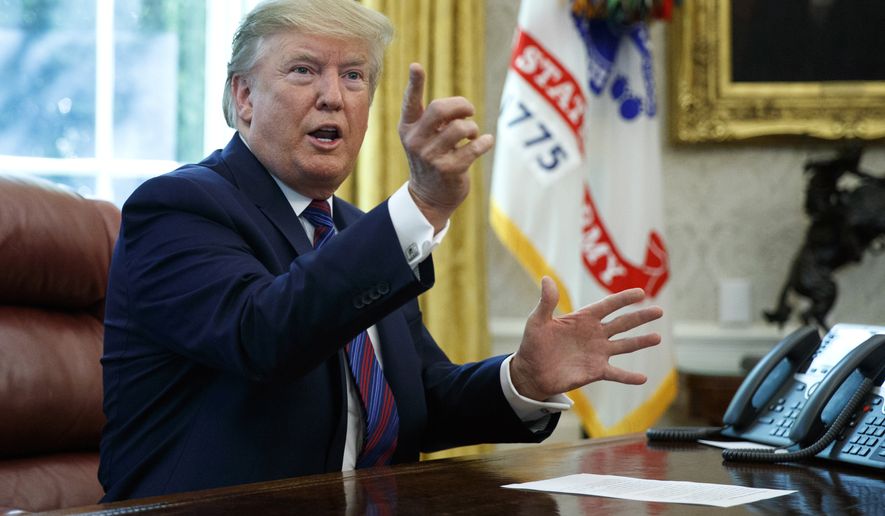President Trump inked a deal with Guatemala on Friday to crack down on migrants who cross that country’s territory en route to the U.S. to claim asylum, with Guatemala’s government agreeing to take them back.
Details of the deal remain to be seen, but in general terms Guatemala says it is willing and able to hold asylum-seekers from elsewhere. That means anyone who crosses through Guatemala and eventually reaches the U.S. to make an asylum claim can be returned to Guatemala to make the claim there instead.
The deal, known informally as a “safe third country agreement,” is expected to be up and running next month, though it may have to clear legal hurdles in Guatemala.
If it takes effect it could have a major impact on the surge of bogus asylum-seekers from countries such as Honduras and El Salvador who are surging across America’s southern border. Given the geography, most of them have to traverse Guatemala to get the the U.S. — and returning them could be a severe disincentive to making the journey in the first place.
“We’ve long been working with Guatemala and now we can do it the right way,” Mr. Trump said in the Oval Office after signing the deal with Guatemalan minister Enrique Degenhart.
The two countries had been near to signing the agreement days ago, but Guatemalan President Jimmy Morales balked. He said he feared an adverse ruling from his country’s courts.
Mr. Trump then took to Twitter to warn about backsliding, and to threaten to use tariffs or other means to punish Guatemala.
One option he suggested was to tax remittances of money sent back home by Guatemalans working in the U.S. Those account for more than 10% of Guatemala’s gross domestic product, which made the threat particularly jarring.
The new deal with Guatemala will not effect Guatemalans themselves who flee north. They are the biggest country sending illegal immigrants across the U.S. border right now, even surpassing Mexico.
Still, the numbers from Honduras, El Salvador and points further south are large — and could be reduced now.
Immigrant-rights activists were horrified at the deal.
“Such an arrangement would make a mockery of the notion that those fleeing persecution in Central America have any recourse,” said Eric Schwartz, president of Refugees International.
When asked whether Guatemala could handle the potential numbers, acting Homeland Security Secretary Kevin McAleenan said the Central American nation is working to build its capacity.
But he also suggested he expects the numbers of people who actually earn status in Guatemala to be low, since only a small fraction of the asylum-seekers actually end up being judged to have valid claims.
Challenged on Guatemala’s safety — the U.S. State Department warns travelers about violence and extortion — Mr. McAleenan said that while there may be some rough parts of the country, it’s made major strides in reducing its murder and violent crime rates.
“We expect that to continue,” he said.
Rep. Eliot Engel, chairman of the House Foreign Affairs Committee, countered that Guatemala isn’t up to the task.
“Simply put, Guatemala is not a safe country for refugees and asylum seekers, as the law requires. It lacks the asylum and protection processes required by U.S. law for negotiation of such an agreement,” he said.
He called Mr. Trump’s announcement “cruel and immoral. It is also illegal.”
In exchange for Guatemala’s cooperation the U.S. will expand access to its seasonal farm guest worker program, the H-2A visas.
“We are going to make that a much easier, less cumbersome program,” Mr. Trump said.
Guatemala’s government, in its own announcement, focused more on that agricultural worker deal.
Mr. Trump said the U.S. will sign safe third country deals with other countries soon.
Finalizing one with Mexico has long been a goal of the U.S., though Mexican officials, despite touting their country as respecting human rights, have resisted American pressure to sign.
That was one of the sticking points in the negotiations last month between the two countries.
The U.S. does have such an agreement with Canada.
Asylum is one of several U.S. policies that illegal immigrants are exploiting to gain a foothold in the U.S.
Few Central Americans have valid claims — only slightly more than 10% win their asylum cases before an immigration judge, officials said this week — but the system is so backed up that merely arriving and making the claim is usually good enough to gain entry and be quickly released into the country, with a work permit soon to follow.
About half of the migrants never even bother to pursue asylum, instead disappearing into the shadows with other illegal immigrants, according to Homeland Security numbers.
• Stephen Dinan can be reached at sdinan@washingtontimes.com.




Please read our comment policy before commenting.